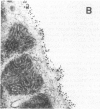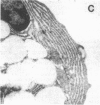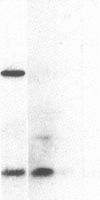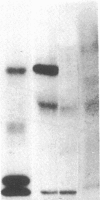Abstract
Four monoclonal antibodies reactive by immunofluorescence and by flow microfluorimetry with canine and porcine gastric parietal cell membranes were produced by fusion of mouse NS-1 myeloma cells with splenocytes from mice immunized with a population of canine gastric mucosal cells containing 60-70% parietal cells. One of these, an IgM antibody designated 2C1, reacted with the surface membranes of parietal cells by immunofluorescence, flow microfluorimetry, and immunogold electron microscopy; competed with 125I-labeled gastrin for binding to gastric cells; and inhibited by 56% maximal gastrin stimulation of [14C]aminopyrine uptake in parietal cells. The antibody immunoprecipitated 125I-labeled samples of a 78-kDa gastrin-binding protein purified from membrane extracts of porcine gastrin mucosa but did not recognize the same protein labeled covalently with 125I-labeled gastrin-(2-17)-hexadecapeptide. These observations suggest that the previously identified 78-kDa gastrin-binding protein is the gastrin receptor and that the antibody 2C1 is directed against the gastrin binding site of the gastrin receptor.
Full text
PDF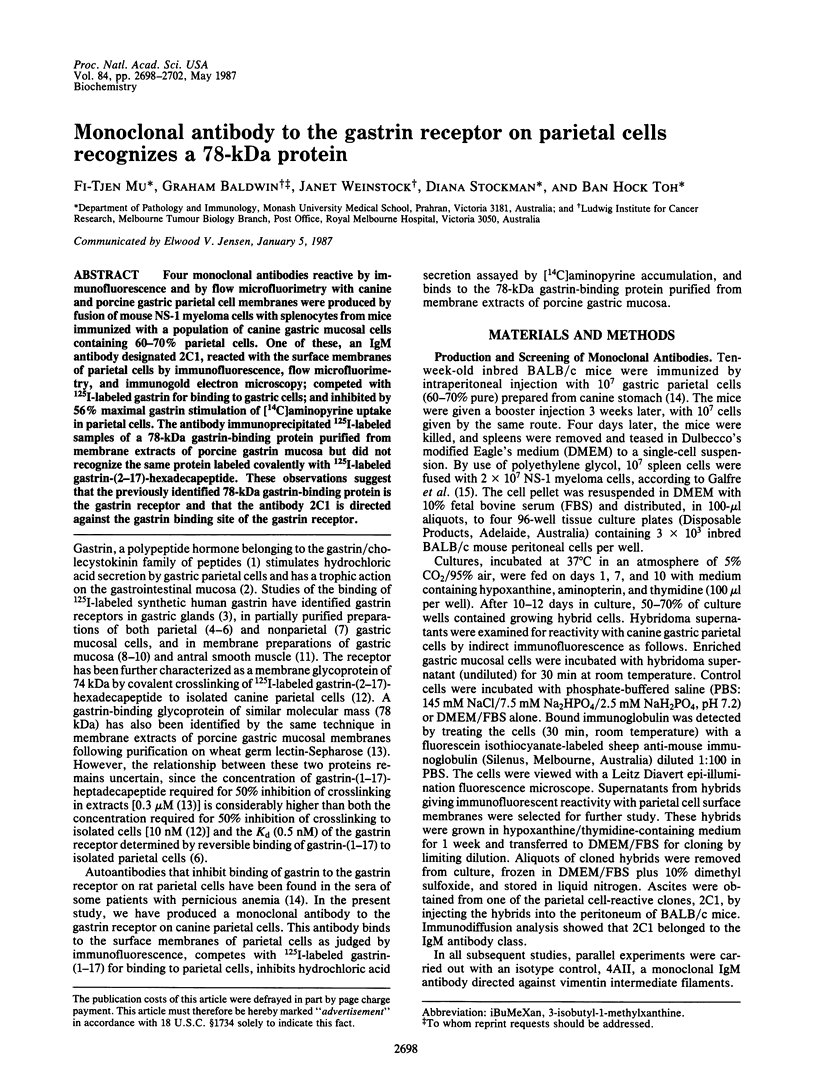
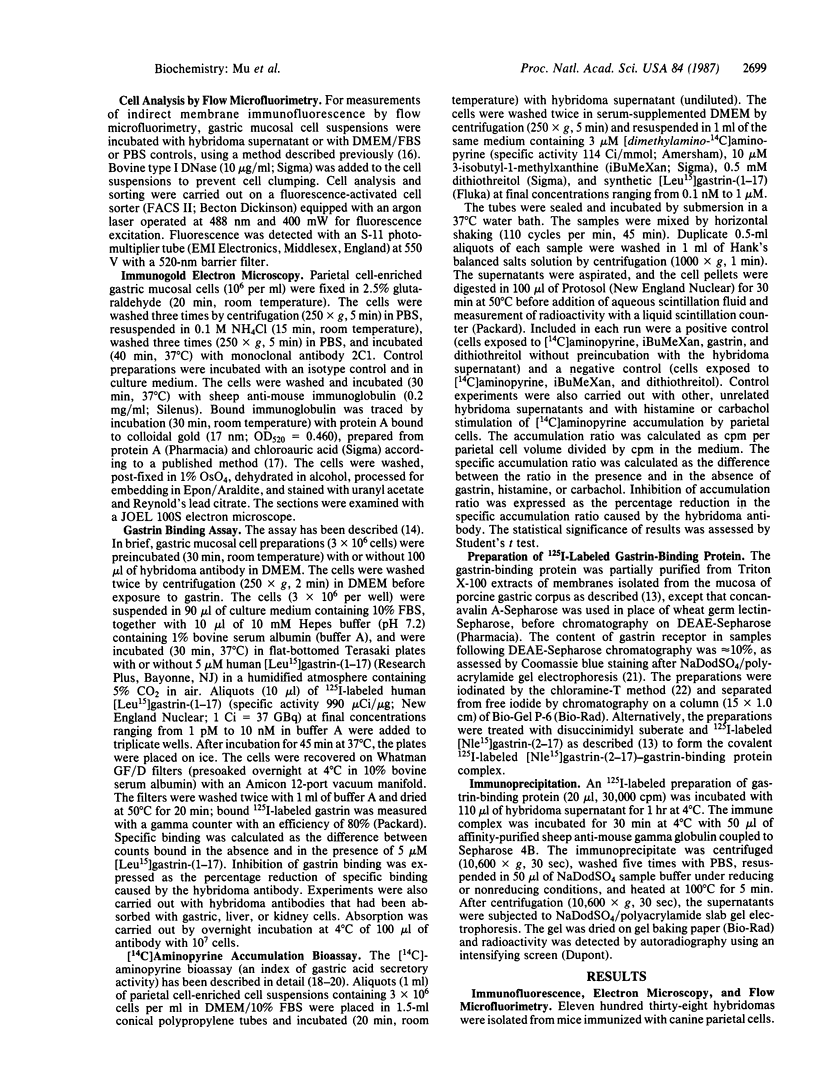
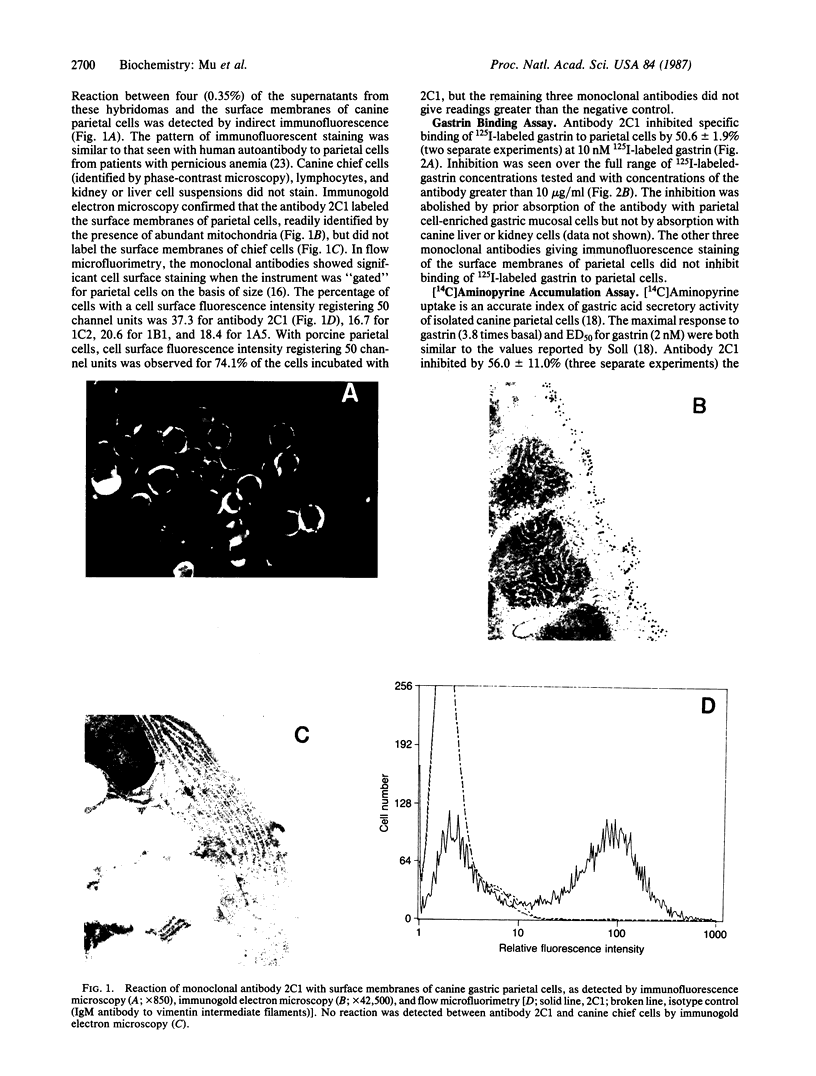
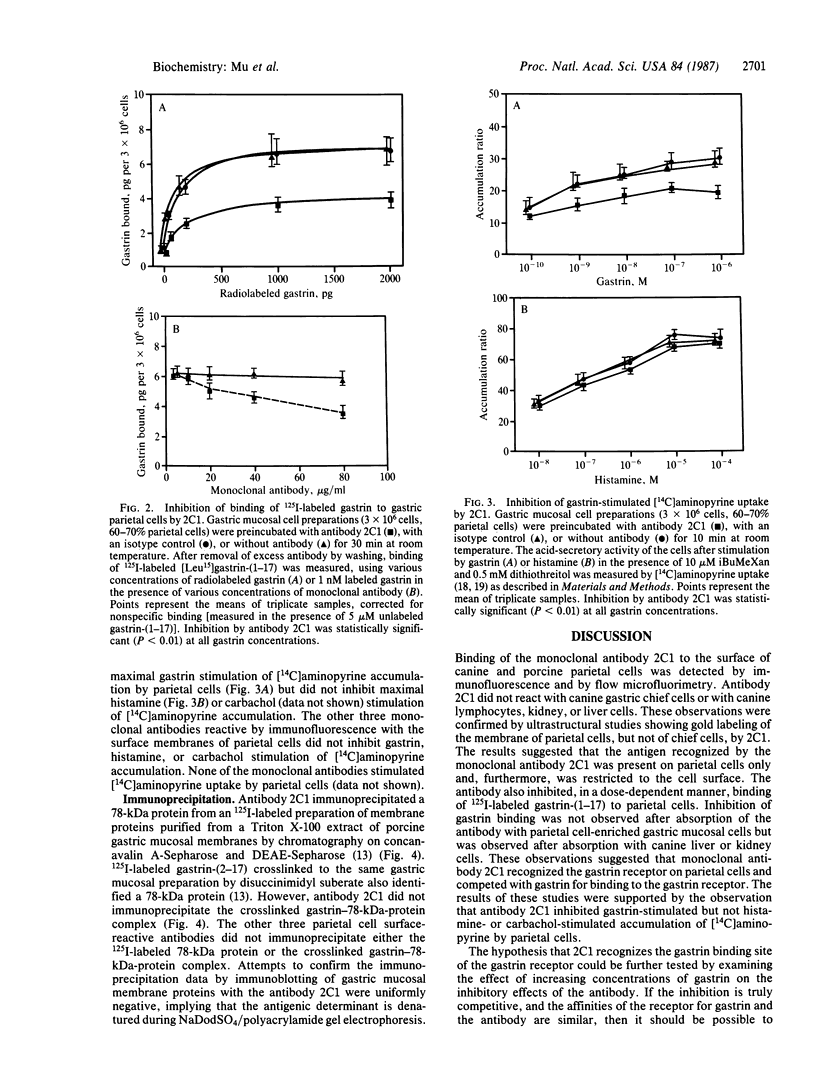
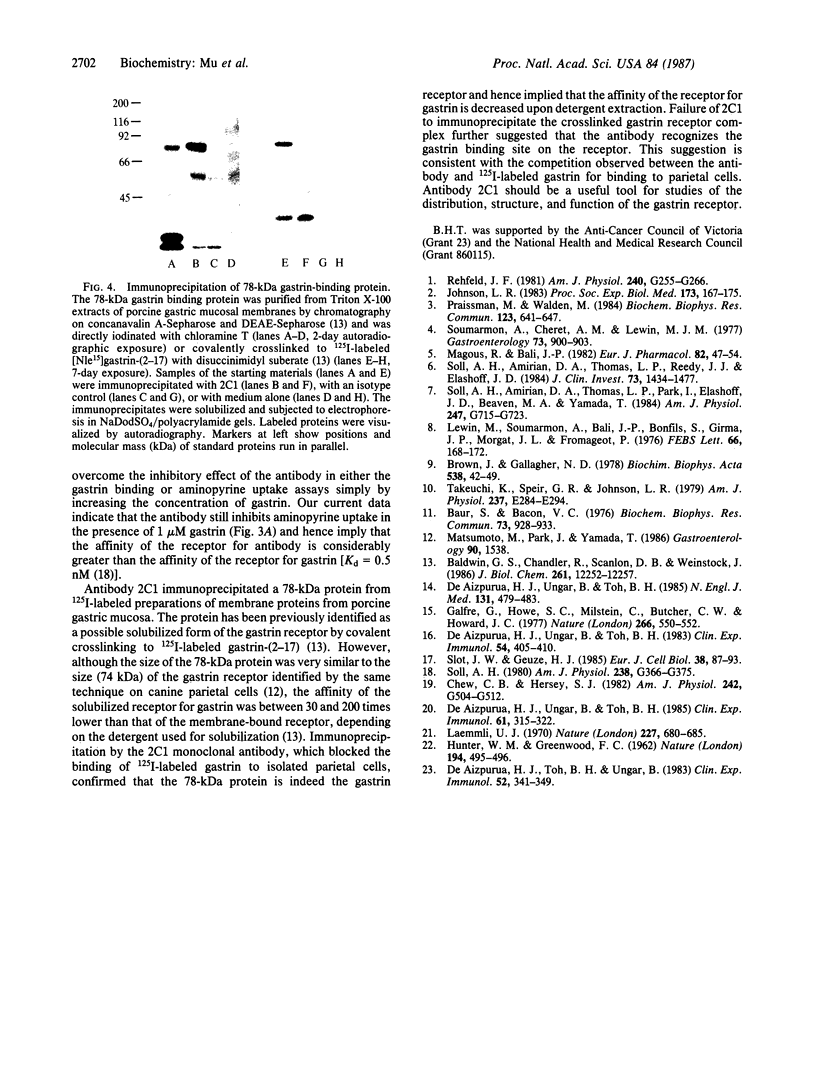
Images in this article
Selected References
These references are in PubMed. This may not be the complete list of references from this article.
- Baldwin G. S., Chandler R., Scanlon D. B., Weinstock J. Identification of a gastrin binding protein in porcine gastric mucosal membranes by covalent cross-linking with iodinated gastrin. J Biol Chem. 1986 Sep 15;261(26):12252–12257. [PubMed] [Google Scholar]
- Baur S., Bacon V. C. A specific gastrin receptor on plasma membranes of antral smooth muscle. Biochem Biophys Res Commun. 1976 Dec 20;73(4):928–933. doi: 10.1016/0006-291x(76)90210-2. [DOI] [PubMed] [Google Scholar]
- Brown J., Gallagher N. D. A specific gastrin receptor site in the rat stomach. Biochim Biophys Acta. 1978 Jan 3;538(1):42–49. doi: 10.1016/0304-4165(78)90250-7. [DOI] [PubMed] [Google Scholar]
- Chew C. S., Hersey S. J. Gastrin stimulation of isolated gastric glands. Am J Physiol. 1982 May;242(5):G504–G512. doi: 10.1152/ajpgi.1982.242.5.G504. [DOI] [PubMed] [Google Scholar]
- De Aizpurua H. J., Ungar B., Toh B. H. Flow microfluorimetric analysis of autoantibody reactions with parietal cell surface membranes in pernicious anaemia. Clin Exp Immunol. 1983 Nov;54(2):405–410. [PMC free article] [PubMed] [Google Scholar]
- Galfre G., Howe S. C., Milstein C., Butcher G. W., Howard J. C. Antibodies to major histocompatibility antigens produced by hybrid cell lines. Nature. 1977 Apr 7;266(5602):550–552. doi: 10.1038/266550a0. [DOI] [PubMed] [Google Scholar]
- HUNTER W. M., GREENWOOD F. C. Preparation of iodine-131 labelled human growth hormone of high specific activity. Nature. 1962 May 5;194:495–496. doi: 10.1038/194495a0. [DOI] [PubMed] [Google Scholar]
- Johnson L. R. Regulation of the mucosal gastrin receptor. Proc Soc Exp Biol Med. 1983 Jun;173(2):167–175. doi: 10.3181/00379727-173-41626. [DOI] [PubMed] [Google Scholar]
- Laemmli U. K. Cleavage of structural proteins during the assembly of the head of bacteriophage T4. Nature. 1970 Aug 15;227(5259):680–685. doi: 10.1038/227680a0. [DOI] [PubMed] [Google Scholar]
- Lewin M., Soumarmon A., Bali J. P., Bonfils S., Girma J. P., Morgat J. L., Fromageot P. Interaction of 3H-labelled synthetic human gastrin I with rat gastric plasma membranes. Evidence for the existence of biologically reactive gastrin receptor sites. FEBS Lett. 1976 Jul 15;66(2):168–172. doi: 10.1016/0014-5793(76)80495-4. [DOI] [PubMed] [Google Scholar]
- Magous R., Bali J. P. High-affinity binding sites for gastrin on isolated rabbit gastric mucosal cells. Eur J Pharmacol. 1982 Aug 13;82(1-2):47–54. doi: 10.1016/0014-2999(82)90551-9. [DOI] [PubMed] [Google Scholar]
- Praissman M., Walden M. The binding characteristics of 125I-gastrin and 125I-CCK8 to guinea pig fundic gastric glands differ: is there more than one binding site for peptides of the CCK-gastrin family? Biochem Biophys Res Commun. 1984 Sep 17;123(2):641–647. doi: 10.1016/0006-291x(84)90277-8. [DOI] [PubMed] [Google Scholar]
- Rehfeld J. F. Four basic characteristics of the gastrin-cholecystokinin system. Am J Physiol. 1981 Apr;240(4):G255–G266. doi: 10.1152/ajpgi.1981.240.4.G255. [DOI] [PubMed] [Google Scholar]
- Slot J. W., Geuze H. J. A new method of preparing gold probes for multiple-labeling cytochemistry. Eur J Cell Biol. 1985 Jul;38(1):87–93. [PubMed] [Google Scholar]
- Soll A. H., Amirian D. A., Thomas L. P., Park J., Elashoff J. D., Beaven M. A., Yamada T. Gastrin receptors on nonparietal cells isolated from canine fundic mucosa. Am J Physiol. 1984 Dec;247(6 Pt 1):G715–G723. doi: 10.1152/ajpgi.1984.247.6.G715. [DOI] [PubMed] [Google Scholar]
- Soll A. H., Amirian D. A., Thomas L. P., Reedy T. J., Elashoff J. D. Gastrin receptors on isolated canine parietal cells. J Clin Invest. 1984 May;73(5):1434–1447. doi: 10.1172/JCI111348. [DOI] [PMC free article] [PubMed] [Google Scholar]
- Soll A. H. Secretagogue stimulation of [14C]aminopyrine accumulation by isolated canine parietal cells. Am J Physiol. 1980 Apr;238(4):G366–G375. doi: 10.1152/ajpgi.1980.238.4.G366. [DOI] [PubMed] [Google Scholar]
- Soumarmon A., Cheret A. M., Lewin M. J. Localization of gastrin receptors in intact isolated and separated rat fundic cells. Gastroenterology. 1977 Oct;73(4 Pt 2):900–903. [PubMed] [Google Scholar]
- Takeuchi K., Speir G. R., Johnson L. R. Mucosal gastrin receptor. I. Assay standardization and fulfillment of receptor criteria. Am J Physiol. 1979 Sep;237(3):E284–E294. doi: 10.1152/ajpendo.1979.237.3.E284. [DOI] [PubMed] [Google Scholar]
- de Aizpurua H. J., Toh B. H., Ungar B. Parietal cell surface reactive autoantibody in pernicious anaemia demonstrated by indirect membrane immunofluorescence. Clin Exp Immunol. 1983 May;52(2):341–349. [PMC free article] [PubMed] [Google Scholar]
- de Aizpurua H. J., Ungar B., Toh B. H. Autoantibody to the gastrin receptor in pernicious anemia. N Engl J Med. 1985 Aug 22;313(8):479–483. doi: 10.1056/NEJM198508223130805. [DOI] [PubMed] [Google Scholar]
- de Aizpurua H. J., Ungar B., Toh B. H. Serum from patients with pernicious anaemia blocks gastrin stimulation of acid secretion by parietal cells. Clin Exp Immunol. 1985 Aug;61(2):315–322. [PMC free article] [PubMed] [Google Scholar]




